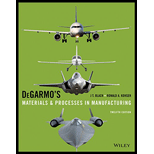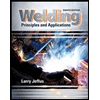
DeGarmo's Materials and Processes in Manufacturing
12th Edition
ISBN: 9781118987674
Author: J. T. Black, Ronald A. Kohser
Publisher: WILEY
expand_more
expand_more
format_list_bulleted
Concept explainers
Textbook Question
Chapter 37, Problem 34RQ
How is inertia welding similar to friction welding? Different from friction welding?
Expert Solution & Answer
Want to see the full answer?
Check out a sample textbook solution
Students have asked these similar questions
my ID# 016948724. Please solve this problem step by step
My ID# 016948724 please find the forces for Fx=0: fy=0: fz=0: please help me to solve this problem step by step
My ID# 016948724 please solve the proble step by step find the forces fx=o: fy=0; fz=0; and find shear moment and the bending moment diagran please draw the diagram for the shear and bending moment
Chapter 37 Solutions
DeGarmo's Materials and Processes in Manufacturing
Ch. 37 - What are the two primary functions of the...Ch. 37 - What are the two major roles of the applied...Ch. 37 - Why might resistance welding be considered a form...Ch. 37 - Why is there no need for fluxes or shielding gases...Ch. 37 - Prob. 5RQCh. 37 - What are the three components that contribute to...Ch. 37 - What measures can be taken to reduce the...Ch. 37 - What factors control the resistance between the...Ch. 37 - What are the possible consequences of too little...Ch. 37 - What is the ideal sequence for pressure...
Ch. 37 - Why do the resistance-welding conditions become...Ch. 37 - What magnitude of current might be required to...Ch. 37 - What are some of the changes that can occur in...Ch. 37 - What is the simplest and most widely used form of...Ch. 37 - What is the typical size of a spot-weld nugget?Ch. 37 - What are the two basic types of stationary...Ch. 37 - What is the major advantage of spot-welding guns?Ch. 37 - What are the pros and cons of a resistance spot...Ch. 37 - What are some of the properties that must be...Ch. 37 - What is the most common metal that is spot welded?Ch. 37 - What is the practical limit of the thicknesses of...Ch. 37 - What design features can be altered to permit the...Ch. 37 - What are the two methods used to produce...Ch. 37 - For what products would resistance butt welding be...Ch. 37 - What two limitations of spot welding can be...Ch. 37 - What limits the number of projection welds that...Ch. 37 - What are some of the attractive features of...Ch. 37 - What are some of the primary limitations to the...Ch. 37 - What type of metallurgical problem might be...Ch. 37 - What were some of the limitations that made the...Ch. 37 - What features promote coalescence in cold welding?Ch. 37 - Describe how the roll-bonding process can be used...Ch. 37 - Describe the friction welding process.Ch. 37 - How is inertia welding similar to friction...Ch. 37 - How are surface impurities removed in the...Ch. 37 - Why are inertia welds of more consistent quality...Ch. 37 - What are some of the geometric limitations of...Ch. 37 - How does linear friction welding differ from...Ch. 37 - How does friction-stir welding differ from...Ch. 37 - What are the primary process variables in...Ch. 37 - What are some of the attractive features of...Ch. 37 - What are some of the materials that have been...Ch. 37 - What is the benefit of adding a preheat laser to...Ch. 37 - Describe the friction-stir spot welding process.Ch. 37 - Prob. 45RQCh. 37 - How do ultrasonic vibrations produce a weld?Ch. 37 - What are some of the geometric limitations of...Ch. 37 - What are some of the attractive features of...Ch. 37 - What are the conditions necessary to produce...Ch. 37 - What kinds of materials can be joined by diffusion...Ch. 37 - How might intermediate layers be used to enhance...Ch. 37 - How are surface contaminants removed during...Ch. 37 - If the interface of a weld is viewed in cross...Ch. 37 - What are some typical applications of explosive...Ch. 37 - Many advanced engineering products, as well as...Ch. 37 - Using the Internet or technical literature,...Ch. 37 - Friction-stir processing is an interesting...Ch. 37 - Investigate the various types of power supplies...Ch. 37 - Consider a muffler being made entirely from...Ch. 37 - Prob. 2CSCh. 37 - Prob. 3CSCh. 37 - An alternate material might be one-side...Ch. 37 - Prob. 5CS
Additional Engineering Textbook Solutions
Find more solutions based on key concepts
Explain how entities are transformed into tables.
Database Concepts (8th Edition)
Speedcoding was invented to overcome two significant shortcomings of the computer hardware of the early 1950s. ...
Concepts Of Programming Languages
The process of input validation works as follows: when the user of a program enters invalid data, the program s...
Starting Out with Python (4th Edition)
A (n) _______operator determines if a specific relationship exists between two values.
Starting Out With Visual Basic (8th Edition)
If the wheel at A exerts a normal force of FA = 80 N on the pipe, determine the normal forces of wheels B and C...
INTERNATIONAL EDITION---Engineering Mechanics: Statics, 14th edition (SI unit)
Find and correct the error(s) in each of the following segments of code: The following code should output the e...
Java How to Program, Early Objects (11th Edition) (Deitel: How to Program)
Knowledge Booster
Learn more about
Need a deep-dive on the concept behind this application? Look no further. Learn more about this topic, mechanical-engineering and related others by exploring similar questions and additional content below.Similar questions
- My ID#016948724 please solve this problems and show me every step clear to follow pleasearrow_forwardMy ID# 016948724arrow_forwardPlease do not use any AI tools to solve this question. I need a fully manual, step-by-step solution with clear explanations, as if it were done by a human tutor. No AI-generated responses, please.arrow_forward
- Please do not use any AI tools to solve this question. I need a fully manual, step-by-step solution with clear explanations, as if it were done by a human tutor. No AI-generated responses, please.arrow_forwardPlease do not use any AI tools to solve this question. I need a fully manual, step-by-step solution with clear explanations, as if it were done by a human tutor. No AI-generated responses, please.arrow_forward[Q2]: The cost information supplied by the cost accountant is as follows:Sales 20,00 units, $ 10 per unitCalculate the (a/ newsale guantity and (b) new selling price to earn the sameVariable cost $ 6 per unit, Fixed Cost $ 30,000, Profit $ 50,000profit ifi) Variable cost increases by $ 2 per unitil) Fixed cost increase by $ 10,000Ili) Variable cost increase by $ 1 per unit and fixed cost reduces by $ 10,000arrow_forward
- can you please help me perform Visual Inspection and Fractography of the attatched image: Preliminary examination to identify the fracture origin, suspected fatigue striation, and corrosion evidences.arrow_forwardcan you please help[ me conduct Causal Analysis (FTA) on the scenario attatched: FTA diagram which is a fault tree analysis diagram will be used to gain an overview of the entire path of failure from root cause to the top event (i.e., the swing’s detachment) and to identify interactions between misuse, material decay and inspection errors.arrow_forwardhi can you please help me in finding the stress intensity factor using a k-calcluator for the scenario attathced in the images.arrow_forward
arrow_back_ios
SEE MORE QUESTIONS
arrow_forward_ios
Recommended textbooks for you
 Welding: Principles and Applications (MindTap Cou...Mechanical EngineeringISBN:9781305494695Author:Larry JeffusPublisher:Cengage Learning
Welding: Principles and Applications (MindTap Cou...Mechanical EngineeringISBN:9781305494695Author:Larry JeffusPublisher:Cengage Learning

Welding: Principles and Applications (MindTap Cou...
Mechanical Engineering
ISBN:9781305494695
Author:Larry Jeffus
Publisher:Cengage Learning
Metal Joining Process-Welding, Brazing and Soldering; Author: Toc H Kochi;https://www.youtube.com/watch?v=PPT5_fDSzGY;License: Standard YouTube License, CC-BY